Emerging Technologies as Teaching Tools in Modern Distance Education
VerifiedAdded on 2023/04/21
|5
|1233
|153
Essay
AI Summary
This essay examines the integration of emerging technologies as teaching tools within distance education, drawing upon two key articles: Terry Anderson's "Theories for learning with emerging technologies" and A.D.H. Khlebus and E. Vrasmas's "Distance education and new teaching tools." It discusses how technology facilitates education by serving as both a medium and a teaching tool, highlighting the impact of ICT on educational activities. While acknowledging the benefits of multimedia and web-based education in enhancing cognitive abilities and affordability, the essay emphasizes the importance of theoretical constructs to validate the use of technologies in learning. It also addresses the potential weaknesses, such as reduced communication between learners and teachers, and concludes that emerging technologies offer cost-effective teaching tools for distance education, supported by the balanced perspectives presented in the analyzed articles. Desklib provides access to similar essays and resources for students.
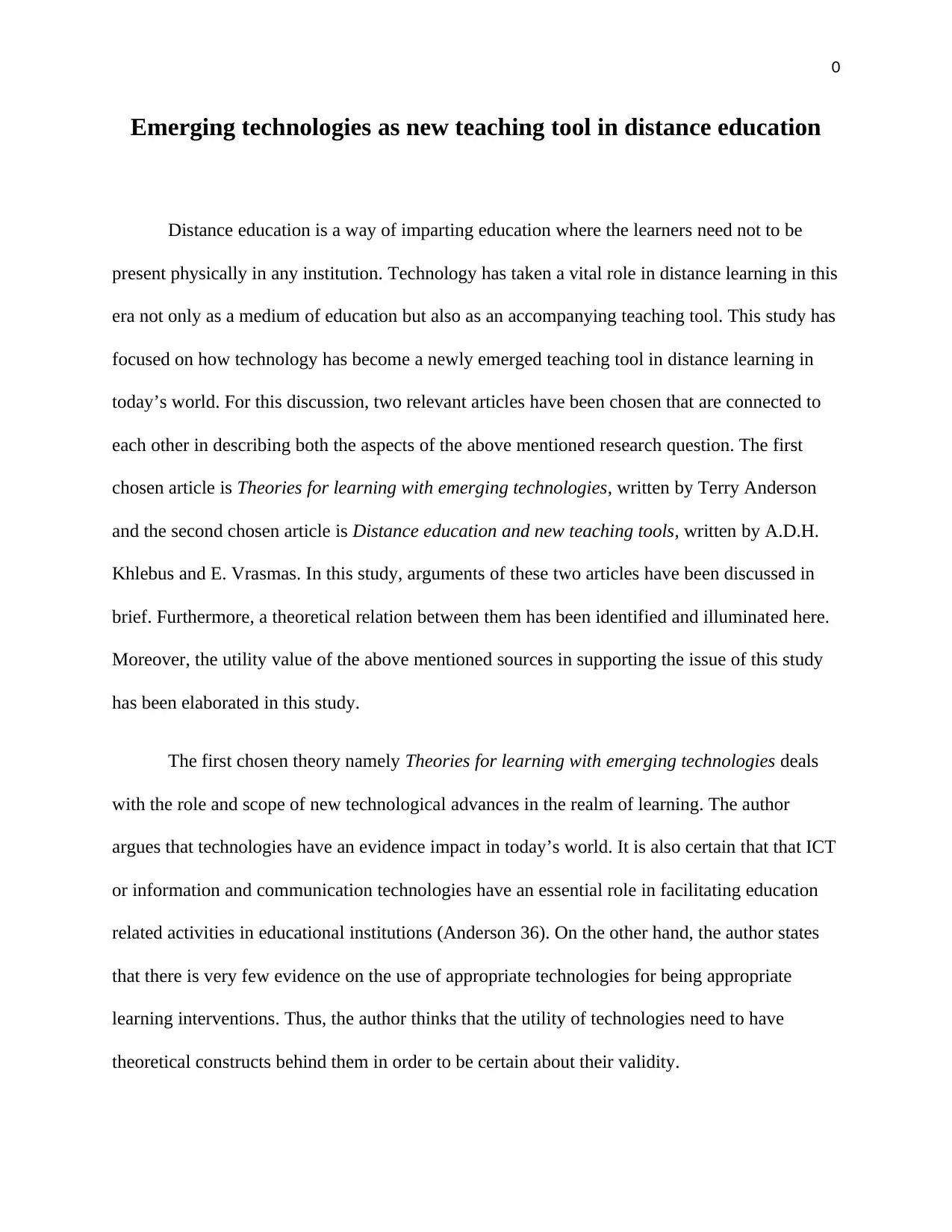
0
Emerging technologies as new teaching tool in distance education
Distance education is a way of imparting education where the learners need not to be
present physically in any institution. Technology has taken a vital role in distance learning in this
era not only as a medium of education but also as an accompanying teaching tool. This study has
focused on how technology has become a newly emerged teaching tool in distance learning in
today’s world. For this discussion, two relevant articles have been chosen that are connected to
each other in describing both the aspects of the above mentioned research question. The first
chosen article is Theories for learning with emerging technologies, written by Terry Anderson
and the second chosen article is Distance education and new teaching tools, written by A.D.H.
Khlebus and E. Vrasmas. In this study, arguments of these two articles have been discussed in
brief. Furthermore, a theoretical relation between them has been identified and illuminated here.
Moreover, the utility value of the above mentioned sources in supporting the issue of this study
has been elaborated in this study.
The first chosen theory namely Theories for learning with emerging technologies deals
with the role and scope of new technological advances in the realm of learning. The author
argues that technologies have an evidence impact in today’s world. It is also certain that that ICT
or information and communication technologies have an essential role in facilitating education
related activities in educational institutions (Anderson 36). On the other hand, the author states
that there is very few evidence on the use of appropriate technologies for being appropriate
learning interventions. Thus, the author thinks that the utility of technologies need to have
theoretical constructs behind them in order to be certain about their validity.
Emerging technologies as new teaching tool in distance education
Distance education is a way of imparting education where the learners need not to be
present physically in any institution. Technology has taken a vital role in distance learning in this
era not only as a medium of education but also as an accompanying teaching tool. This study has
focused on how technology has become a newly emerged teaching tool in distance learning in
today’s world. For this discussion, two relevant articles have been chosen that are connected to
each other in describing both the aspects of the above mentioned research question. The first
chosen article is Theories for learning with emerging technologies, written by Terry Anderson
and the second chosen article is Distance education and new teaching tools, written by A.D.H.
Khlebus and E. Vrasmas. In this study, arguments of these two articles have been discussed in
brief. Furthermore, a theoretical relation between them has been identified and illuminated here.
Moreover, the utility value of the above mentioned sources in supporting the issue of this study
has been elaborated in this study.
The first chosen theory namely Theories for learning with emerging technologies deals
with the role and scope of new technological advances in the realm of learning. The author
argues that technologies have an evidence impact in today’s world. It is also certain that that ICT
or information and communication technologies have an essential role in facilitating education
related activities in educational institutions (Anderson 36). On the other hand, the author states
that there is very few evidence on the use of appropriate technologies for being appropriate
learning interventions. Thus, the author thinks that the utility of technologies need to have
theoretical constructs behind them in order to be certain about their validity.
Paraphrase This Document
Need a fresh take? Get an instant paraphrase of this document with our AI Paraphraser
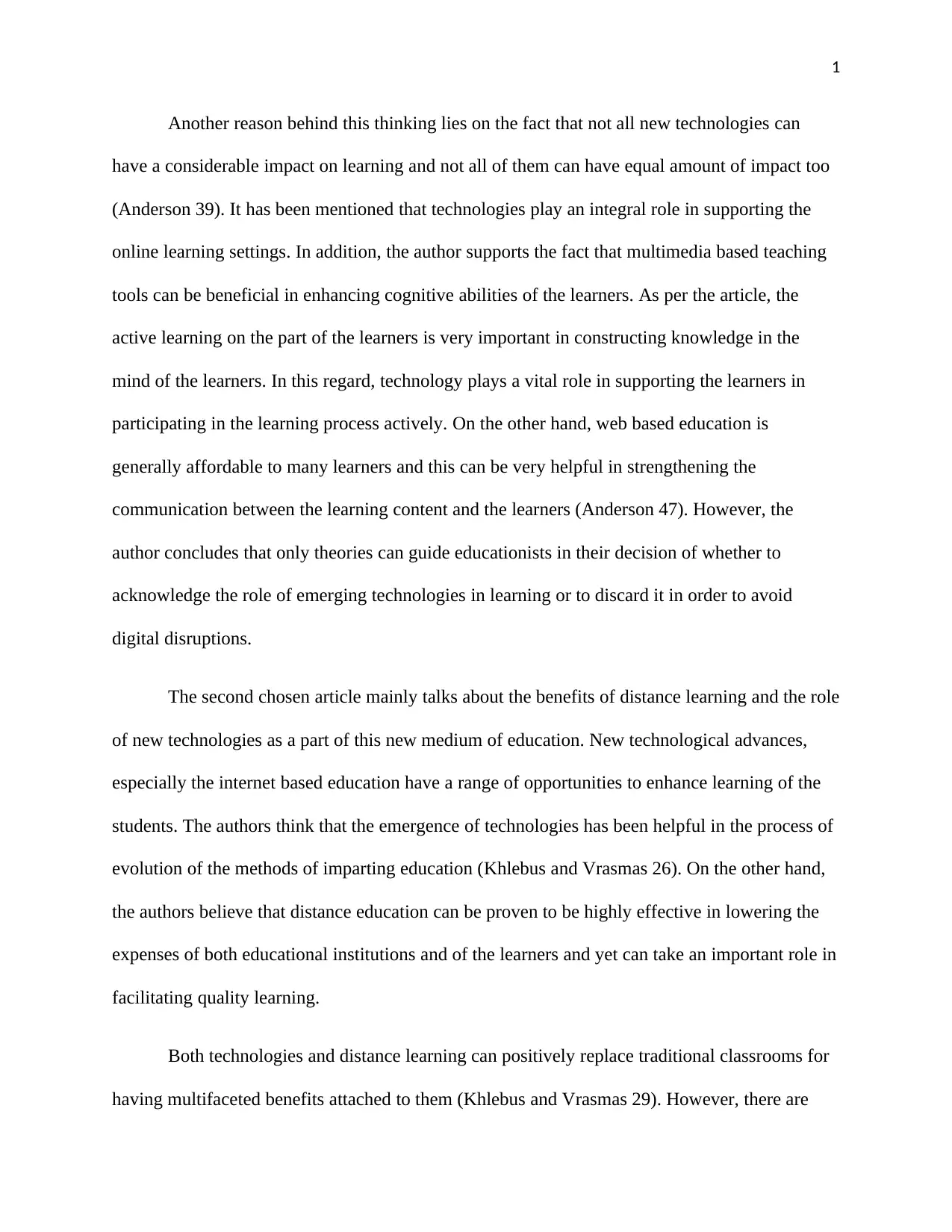
1
Another reason behind this thinking lies on the fact that not all new technologies can
have a considerable impact on learning and not all of them can have equal amount of impact too
(Anderson 39). It has been mentioned that technologies play an integral role in supporting the
online learning settings. In addition, the author supports the fact that multimedia based teaching
tools can be beneficial in enhancing cognitive abilities of the learners. As per the article, the
active learning on the part of the learners is very important in constructing knowledge in the
mind of the learners. In this regard, technology plays a vital role in supporting the learners in
participating in the learning process actively. On the other hand, web based education is
generally affordable to many learners and this can be very helpful in strengthening the
communication between the learning content and the learners (Anderson 47). However, the
author concludes that only theories can guide educationists in their decision of whether to
acknowledge the role of emerging technologies in learning or to discard it in order to avoid
digital disruptions.
The second chosen article mainly talks about the benefits of distance learning and the role
of new technologies as a part of this new medium of education. New technological advances,
especially the internet based education have a range of opportunities to enhance learning of the
students. The authors think that the emergence of technologies has been helpful in the process of
evolution of the methods of imparting education (Khlebus and Vrasmas 26). On the other hand,
the authors believe that distance education can be proven to be highly effective in lowering the
expenses of both educational institutions and of the learners and yet can take an important role in
facilitating quality learning.
Both technologies and distance learning can positively replace traditional classrooms for
having multifaceted benefits attached to them (Khlebus and Vrasmas 29). However, there are
Another reason behind this thinking lies on the fact that not all new technologies can
have a considerable impact on learning and not all of them can have equal amount of impact too
(Anderson 39). It has been mentioned that technologies play an integral role in supporting the
online learning settings. In addition, the author supports the fact that multimedia based teaching
tools can be beneficial in enhancing cognitive abilities of the learners. As per the article, the
active learning on the part of the learners is very important in constructing knowledge in the
mind of the learners. In this regard, technology plays a vital role in supporting the learners in
participating in the learning process actively. On the other hand, web based education is
generally affordable to many learners and this can be very helpful in strengthening the
communication between the learning content and the learners (Anderson 47). However, the
author concludes that only theories can guide educationists in their decision of whether to
acknowledge the role of emerging technologies in learning or to discard it in order to avoid
digital disruptions.
The second chosen article mainly talks about the benefits of distance learning and the role
of new technologies as a part of this new medium of education. New technological advances,
especially the internet based education have a range of opportunities to enhance learning of the
students. The authors think that the emergence of technologies has been helpful in the process of
evolution of the methods of imparting education (Khlebus and Vrasmas 26). On the other hand,
the authors believe that distance education can be proven to be highly effective in lowering the
expenses of both educational institutions and of the learners and yet can take an important role in
facilitating quality learning.
Both technologies and distance learning can positively replace traditional classrooms for
having multifaceted benefits attached to them (Khlebus and Vrasmas 29). However, there are
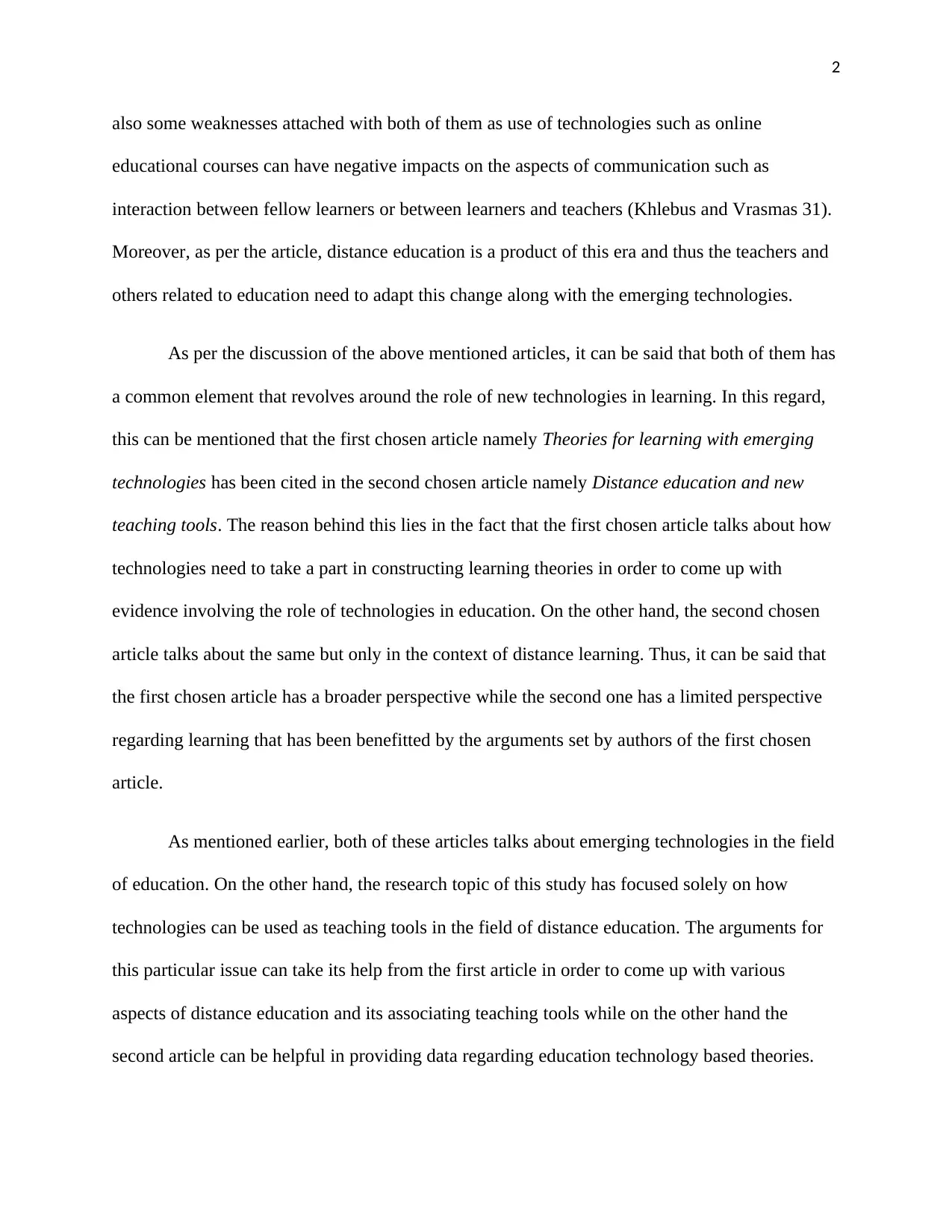
2
also some weaknesses attached with both of them as use of technologies such as online
educational courses can have negative impacts on the aspects of communication such as
interaction between fellow learners or between learners and teachers (Khlebus and Vrasmas 31).
Moreover, as per the article, distance education is a product of this era and thus the teachers and
others related to education need to adapt this change along with the emerging technologies.
As per the discussion of the above mentioned articles, it can be said that both of them has
a common element that revolves around the role of new technologies in learning. In this regard,
this can be mentioned that the first chosen article namely Theories for learning with emerging
technologies has been cited in the second chosen article namely Distance education and new
teaching tools. The reason behind this lies in the fact that the first chosen article talks about how
technologies need to take a part in constructing learning theories in order to come up with
evidence involving the role of technologies in education. On the other hand, the second chosen
article talks about the same but only in the context of distance learning. Thus, it can be said that
the first chosen article has a broader perspective while the second one has a limited perspective
regarding learning that has been benefitted by the arguments set by authors of the first chosen
article.
As mentioned earlier, both of these articles talks about emerging technologies in the field
of education. On the other hand, the research topic of this study has focused solely on how
technologies can be used as teaching tools in the field of distance education. The arguments for
this particular issue can take its help from the first article in order to come up with various
aspects of distance education and its associating teaching tools while on the other hand the
second article can be helpful in providing data regarding education technology based theories.
also some weaknesses attached with both of them as use of technologies such as online
educational courses can have negative impacts on the aspects of communication such as
interaction between fellow learners or between learners and teachers (Khlebus and Vrasmas 31).
Moreover, as per the article, distance education is a product of this era and thus the teachers and
others related to education need to adapt this change along with the emerging technologies.
As per the discussion of the above mentioned articles, it can be said that both of them has
a common element that revolves around the role of new technologies in learning. In this regard,
this can be mentioned that the first chosen article namely Theories for learning with emerging
technologies has been cited in the second chosen article namely Distance education and new
teaching tools. The reason behind this lies in the fact that the first chosen article talks about how
technologies need to take a part in constructing learning theories in order to come up with
evidence involving the role of technologies in education. On the other hand, the second chosen
article talks about the same but only in the context of distance learning. Thus, it can be said that
the first chosen article has a broader perspective while the second one has a limited perspective
regarding learning that has been benefitted by the arguments set by authors of the first chosen
article.
As mentioned earlier, both of these articles talks about emerging technologies in the field
of education. On the other hand, the research topic of this study has focused solely on how
technologies can be used as teaching tools in the field of distance education. The arguments for
this particular issue can take its help from the first article in order to come up with various
aspects of distance education and its associating teaching tools while on the other hand the
second article can be helpful in providing data regarding education technology based theories.
⊘ This is a preview!⊘
Do you want full access?
Subscribe today to unlock all pages.

Trusted by 1+ million students worldwide
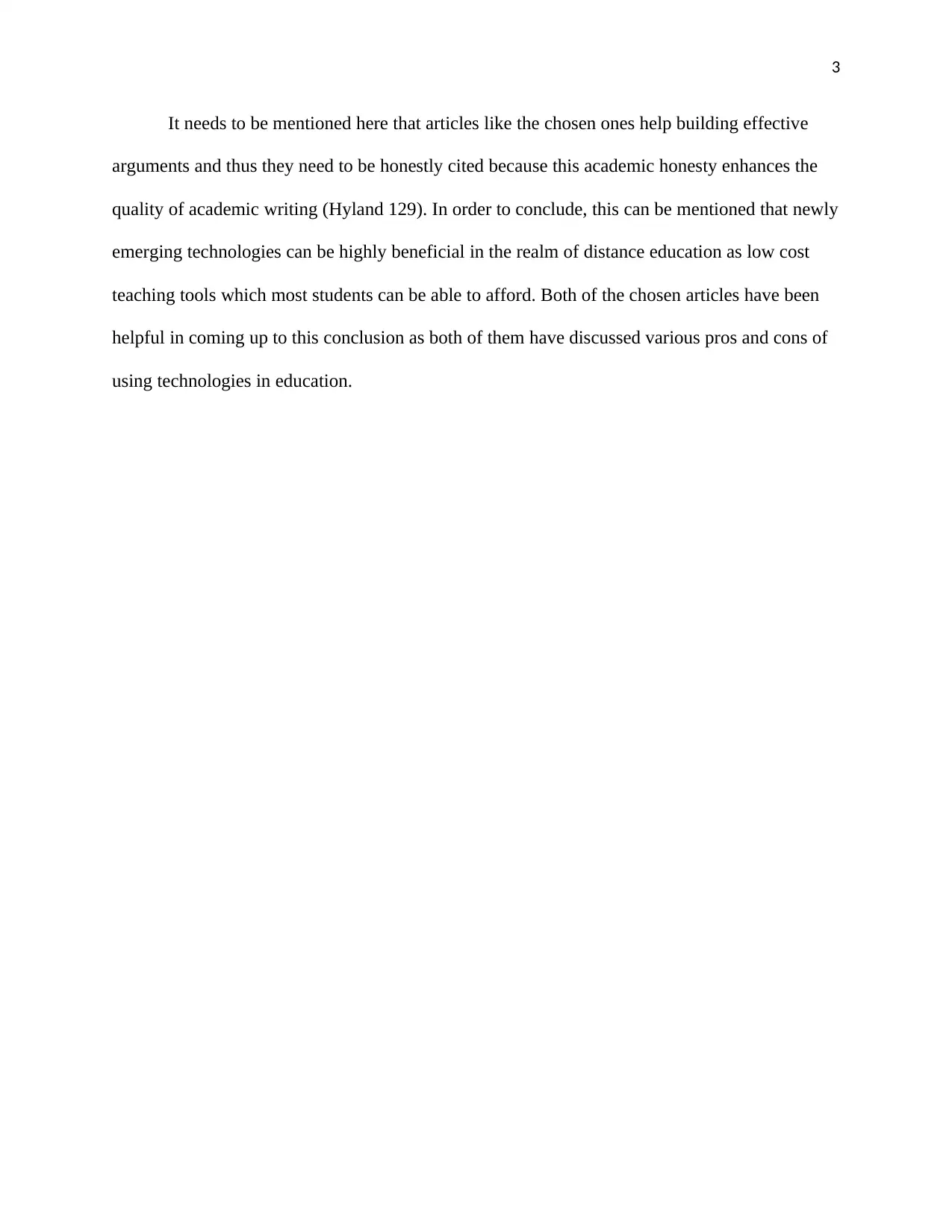
3
It needs to be mentioned here that articles like the chosen ones help building effective
arguments and thus they need to be honestly cited because this academic honesty enhances the
quality of academic writing (Hyland 129). In order to conclude, this can be mentioned that newly
emerging technologies can be highly beneficial in the realm of distance education as low cost
teaching tools which most students can be able to afford. Both of the chosen articles have been
helpful in coming up to this conclusion as both of them have discussed various pros and cons of
using technologies in education.
It needs to be mentioned here that articles like the chosen ones help building effective
arguments and thus they need to be honestly cited because this academic honesty enhances the
quality of academic writing (Hyland 129). In order to conclude, this can be mentioned that newly
emerging technologies can be highly beneficial in the realm of distance education as low cost
teaching tools which most students can be able to afford. Both of the chosen articles have been
helpful in coming up to this conclusion as both of them have discussed various pros and cons of
using technologies in education.
Paraphrase This Document
Need a fresh take? Get an instant paraphrase of this document with our AI Paraphraser
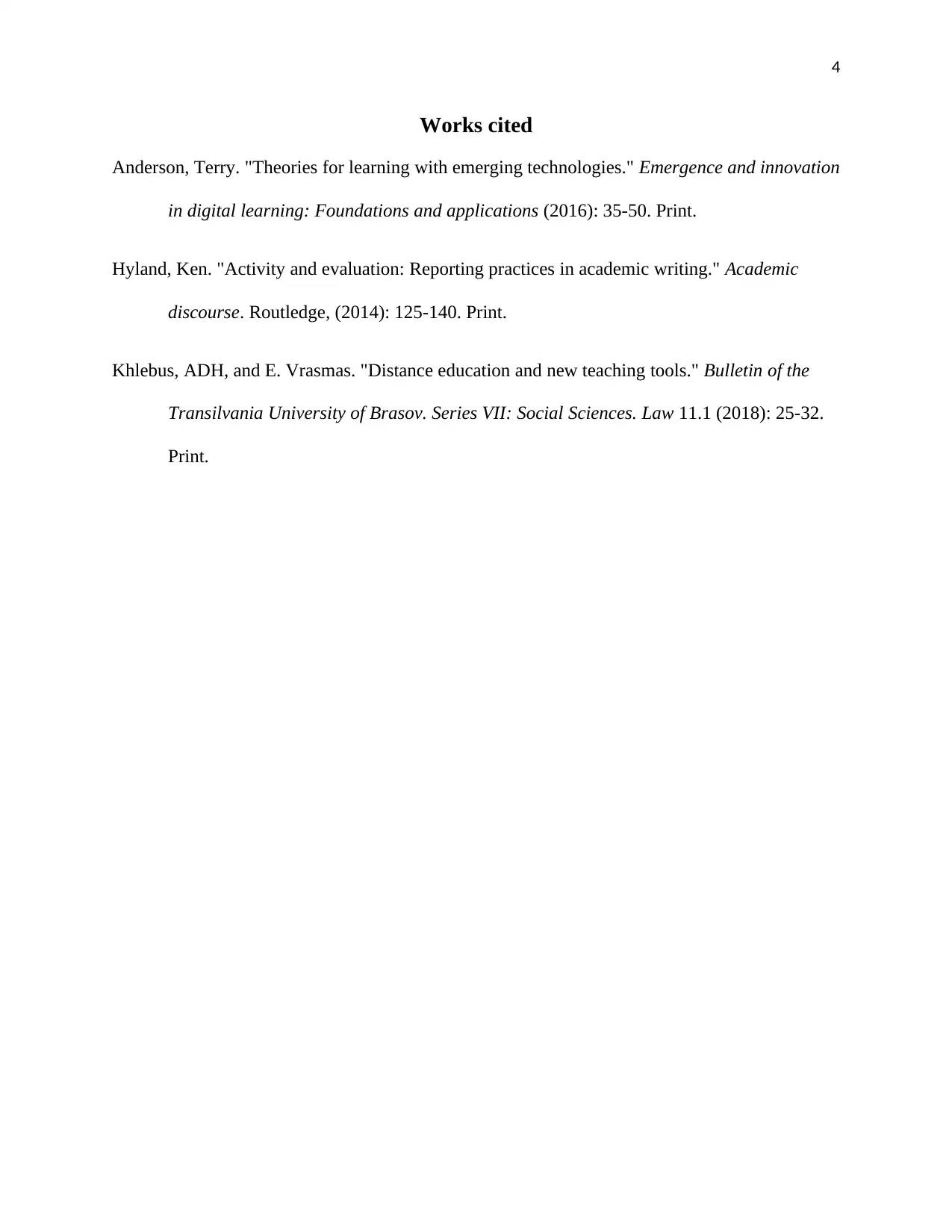
4
Works cited
Anderson, Terry. "Theories for learning with emerging technologies." Emergence and innovation
in digital learning: Foundations and applications (2016): 35-50. Print.
Hyland, Ken. "Activity and evaluation: Reporting practices in academic writing." Academic
discourse. Routledge, (2014): 125-140. Print.
Khlebus, ADH, and E. Vrasmas. "Distance education and new teaching tools." Bulletin of the
Transilvania University of Brasov. Series VII: Social Sciences. Law 11.1 (2018): 25-32.
Print.
Works cited
Anderson, Terry. "Theories for learning with emerging technologies." Emergence and innovation
in digital learning: Foundations and applications (2016): 35-50. Print.
Hyland, Ken. "Activity and evaluation: Reporting practices in academic writing." Academic
discourse. Routledge, (2014): 125-140. Print.
Khlebus, ADH, and E. Vrasmas. "Distance education and new teaching tools." Bulletin of the
Transilvania University of Brasov. Series VII: Social Sciences. Law 11.1 (2018): 25-32.
Print.
1 out of 5
Related Documents
Your All-in-One AI-Powered Toolkit for Academic Success.
+13062052269
info@desklib.com
Available 24*7 on WhatsApp / Email
![[object Object]](/_next/static/media/star-bottom.7253800d.svg)
Unlock your academic potential
Copyright © 2020–2026 A2Z Services. All Rights Reserved. Developed and managed by ZUCOL.




